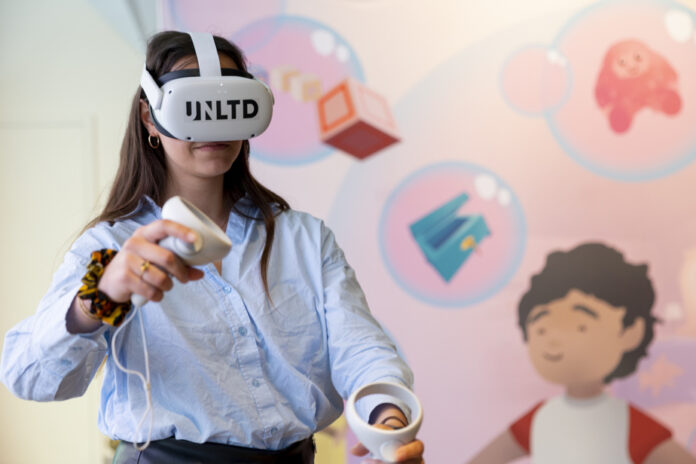Virtual reality glasses on his face, headphones on his ears, controllers in his hands, we dive into the world of Lou, a young autistic boy who is celebrating his fifth birthday.
In one of the first scenes, we find ourselves in a room. Our bedroom. On the bed sits our favorite dog, the only one who manages to comfort us.
Under our fingers, the controllers vibrate, a sign that a movement is expected from us. We grab the stuffed animal and everything turns pink around us, like we’ve just dipped in cotton candy. It’s fascinating.
Back in the room, a voice invites us to turn our attention to a box. A new vibration is felt. We approach a hand to the lid and slam it. At first timidly, then forcefully. Music rises. In real life, we smile. This improvised musical piece is rather amusing. Then our mother appears, angry to hear so much noise. The screen darkens.
Feet Up: Lou also takes us to high school. Around us, we see the sometimes intrigued, sometimes nasty look of the other students. We hear their judgments and their laughter. Behind the virtual reality glasses, we have a thought for young autistic people who are likely to live with contempt on a daily basis.
“More empathetic, that’s what we would like people to be after having lived the experience,” says Martine Asselin, one of the two creators of this unique work.
“Our deepest desire was to bring the spectator from his passive posture to an active posture”, adds his accomplice Annick Daigneault.
The two women, who each have an autistic son, are convinced that by allowing people to embody the character of Lou, it is possible to “create bridges and foster encounter and dialogue”.
“After experiencing it, the next time you see an autistic person flapping, you’re less confused, you find it less strange, you’re less uncomfortable with the behavior,” says as an example Martine Asselin.
The two creators themselves showed great curiosity for autism and its different forms through the project.
To imagine the character of Lou, they have multiplied meetings with autistic people in order to better understand their reality, because they do not all experience the same thing.
“There are those who will never learn to speak. There are hypersensitive people. Others, hyposensitive. […] In terms of social relations, it’s the same thing. Some will find it easier to endorse social codes. Others, less,” explains Martine Asselin.
“Autism is a neurological difference. It is not an illness. It’s a perception, a decoding of information that is different, “she summarizes.
Martine Asselin and Annick Daigneault have been working on the collective Les pieds en haut since 2016. Before creating Lou, they had given life to Mathys. Unlike its predecessor, this new component is in 6D and allows you to be physically engaged, specifies Annick Daigneault.
Last week Feet Up: Lou was crowned Best Immersive Experience at the Canadian Screen Awards. The work has also been presented at the international festivals South by Southwest, in Austin, and One World, in Prague.
Very proud of this influence, the two creators who campaign for better inclusion of neurodiversity are already working on the next part: living with autism as an adult.








